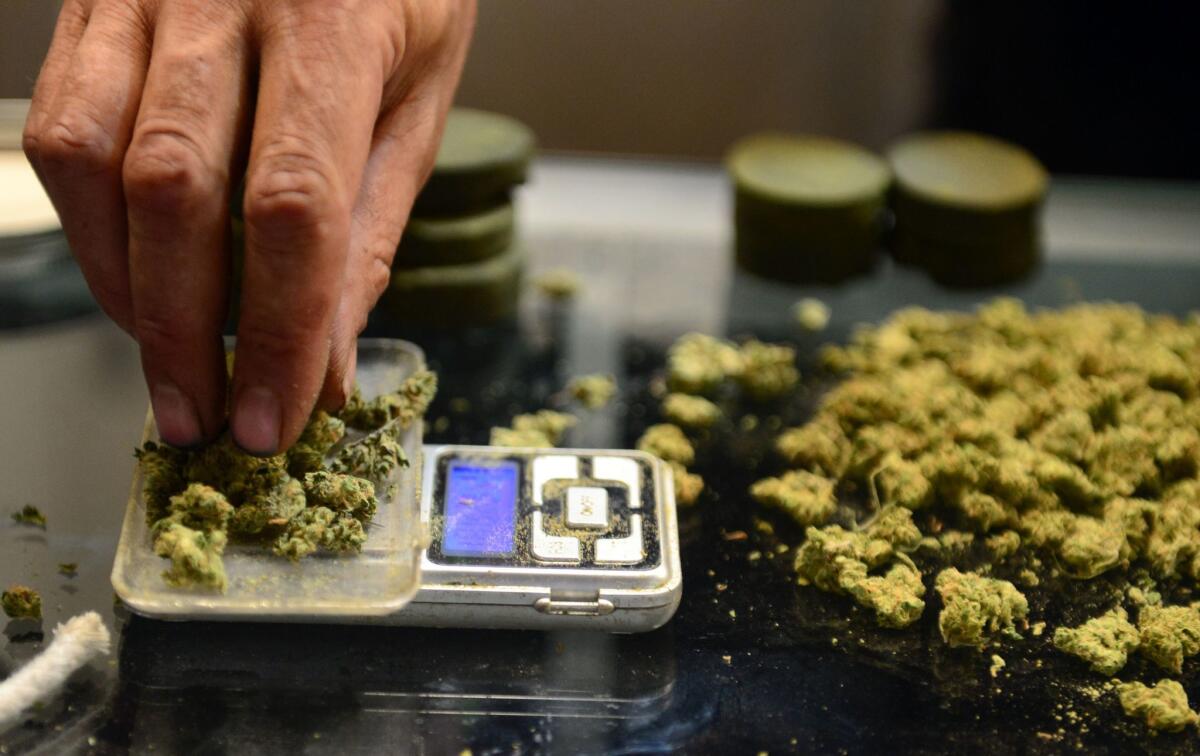Editorial: In California, a way out of the medical marijuana morass

- Share via
Nearly two decades after California voters legalized medical marijuana, legislators are as close as they’ve ever been to passing the first comprehensive statewide regulations for the cultivation, transportation and distribution of the drug. This is long past due. State leaders should not let another year go by without fixing the medical marijuana mess.
And it is a mess. The Compassionate Use Act of 1996 encouraged state leaders to implement a plan to regulate safe and affordable distribution of marijuana to patients. But they were late to act and then developed ineffective guidelines. As a result, California has a patchwork of local rules governing dispensaries, but virtually no regulations on how marijuana is grown or processed, and few consumer protections for a product that, ostensibly, is for sick people.
Senate Bill 1262 is still a work in progress, but with some tweaks it would be a huge improvement over the current situation. It was introduced in February by Sen. Lou Correa (D-Santa Ana) and sponsored by the League of California Cities and the Police Chiefs Assn. The two groups have traditionally opposed efforts to legitimize the cannabis industry but came to realize that a well-crafted statewide regulatory structure could help cities and police manage the proliferation of medicinal marijuana more effectively and could serve as a framework for regulation if California follows the lead of Colorado and Washington and legalizes the recreational use of the drug.
The bill as currently drafted would create a Bureau of Medical Marijuana Regulation within the Department of Consumer Affairs that would license individuals who grow, process, transport and sell the drug. The goal is to track cannabis from farm to state-certified testing laboratory to dispensary, to ensure that the product is produced legally and meets quality standards and labeling requirements. Licenses would cost $8,000 and would be granted only after a business gets local approval to operate.
So far, so good. But medical marijuana advocates have raised several concerns that reveal the challenge of legitimizing an industry that has operated in the shadows. For example, the bill would deny licenses to grow, transport or dispense marijuana to anyone with a conviction for drug trafficking, no matter how long ago the crime was committed. This provision would ban some reputable operators who got caught in the conflict between state and federal law, under which marijuana is still illegal.
Also, the state would grant a license only if the cultivator or distributor could show that local rules were being followed. But few jurisdictions permit or regulate cannabis farms, meaning much of the state’s marijuana is grown in a legal limbo and those growers cannot produce proof of compliance. This could also be a problem in Los Angeles. Proposition D granted more than 100 dispensaries limited immunity from city enforcement, but officials are concerned that because L.A. does not actually issue permits to those dispensaries the operators would not be able to get a state license.
Statewide regulation should sanction legitimate medical marijuana businesses and eliminate criminal elements so that customers can get a safe, reliable product. If the bill is too punitive, marijuana operators will go back into the shadows and California will be stuck in the same mess.
Follow the Opinion section on Twitter @latimesopinion
More to Read
A cure for the common opinion
Get thought-provoking perspectives with our weekly newsletter.
You may occasionally receive promotional content from the Los Angeles Times.










